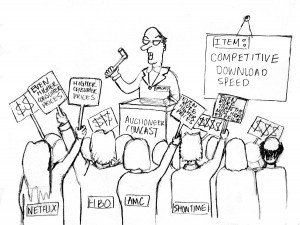Net neutrality should be protected at all costs
Net neutrality is under attack in the United States. If you don’t know what net neutrality is, or why you should care, answer the following question: Why are you reading this?
You might think, “Because I clicked on the link,” or “Because the headline looked interesting.”
All the above are reasons you want to read this column. But in today’s world of information overload, you all have busy lives and short attention spans. As much as it pains me to say this, if you’re reading online, the time it takes your Internet browser to load this column plays the biggest role in determining whether or not you will actually read it.
This is true of everything from my weekly rants to shows like Game of Thrones on HBO to YouTube videos of parents telling their kids they ate all of their Halloween candy. These days, Google engineers have discovered that a difference of 250 milliseconds in loading time gives one website a competitive advantage over another. Statistically speaking, if the good folks at the Daily Bruin had a website that loaded a blink of an eye faster than the Daily Trojan, they would have a significant competitive advantage.
“Net neutrality” is the concept that all data deserves to be treated equally — in other words, that Internet service providers like Comcast and Time Warner that act as middle men between you and your Game of Thrones episode can’t allow websites like the Daily Bruin (or more realistically, Netflix) to pay extra to increase their loading speed — and thus, their advantage over competitors with less money.
As of 2010, the Federal Communications Commission adopted an “Open Internet Order,” which included, in part, a ban on unfair content discrimination and a refusal to approve “pay for priority” agreements. There are three problems with current policy: the rule does not explicitly prohibit ISPs from charging more money for faster access. Second, earlier this year, the D.C. Circuit Court ruled that the FCC could not enforce network neutrality rules on specific companies (in that case, Verizon) that enforced network neutrality rules. Third, the FCC is considering new rules this year that go against protecting net neutrality, and allow ISPs to charge content providers more money if they want their videos to load faster.
Net neutrality should be supported, plain and simple. For one, without it, corporations have broad discretion over who sees what public information. If you think China censors its Internet, imagine if a Time Warner or Comcast CEO decided to charge certain news outlets with political leanings more to increase their download speeds. Putting freedom to access information in the hands of corporations makes about as much sense as Little Red Riding Hood hiring the Big Bad Wolf to watch Grandma.
The moral of the story is that net neutrality is a question of values as much at it is a question of policy. A shift away from net neutrality represent not only the beginning of the decline of American democracy, but also the beginning of the end of the free market. Abandoning net neutrality would allow near perfect price discrimination in the Internet market. Monopolies like Comcast and Time Warner, because they have an enormous share of the market, could charge outlandish prices without fear of competition. Moreover, they could create tiers of Internet speed service. When Netflix has to pay more to secure a higher download speed than HBO, guess who will also pay more? You.
Oh, and did I mention Comcast is trying to acquire Time Warner in order to become an even bigger company? Federal regulators would stop such a move, but Comcast spent more money lobbying the government last year (to the tune of 18.8 million) than every single corporation except one. Why? To convince the government to approve the buyout of Time Warner: a situation that, regardless of the debate over net neutrality, should be opposed at all costs.
From President Barack Obama to HBO comedian John Oliver, opposition to chipping away at network neutrality is strong. The problem is that though Obama issued a statement in support of net neutrality and received much backlash, he is also responsible for appointing the current FCC commissioner Tom Wheeler, a venture capitalist who previously worked as a lobbyist for the telecommunications industry, and the man partly responsible for the new FCC rules. Though Oliver delivered a brilliant segment in opposition to the new rules as well, Oliver knows that whatever happens, HBO, which carries his show, will always be able to afford to buy an Internet fast lane.
In short, these people make good arguments — but they don’t have a dog in the fight.
What about a college newspaper like the Daily Trojan? We would never be able to afford to make our content download as fast as any other media network in such a world.
In short, we would lose our voice. Dissenting articles like this one might never see the light of day. In Game of Thrones, the Lannister family has enough power to control the country and silence dissenters. If net neutrality is abandoned, Americans won’t just be paying more to watch that story — they’ll be living in it.
Nathaniel Haas is a junior majoring in political science and economics. His column, “State of the Union,” runs Fridays.


